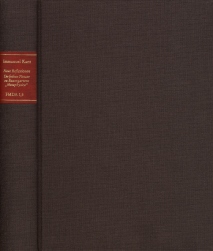Immanuel Kant: Neue Reflexionen. Die frühen Notate zu Baumgartens ›Metaphysica‹.
Mit einer Edition der dritten Auflage dieses Werks.
Links / Downloads
Kant’s so-called reflections are the key documents for reconstructing the history of his philosophical development. This applies particularly to those reflections which Kant noted in his compendium of metaphysics, A.G. Baumgarten’s ›Metaphysica‹, a work which accompanied him longer in his philosophical life than any other and had the greatest influence on his metaphysical thinking. In Volumes XV, XVII and XVIII, the Academy edition of Kant’s writings edited the notes from Kant’s personal copy of the fourth edition of ›Metaphysica‹ (1757). It is well known that Kant had a copy of the third edition (1750) and annotated this. However, this personal copy had previously not been available to those doing research on Kant. It was not discovered until 2000.
This spectacular discovery is being presented here for the first time, along with a detailed introduction, an explanatory apparatus and indexes. Kant made these notes to prepare for the course of lectures on metaphysics which he had announced for the summer semester of 1756. They provide a unique insight into his literary, historical and philosophical interests at the beginning of his academic career and extend far beyond everything which was known up to now. Even at that time, Kant was focusing strongly on the problems of the concept of world which he dealt with later in the antimony of pure reason. He shows a noticeable interest in empirical psychology. Through Baumgarten, Kant became more familiar, on a high philosophical level of reflection, with man as a knowing and willing being, and by studying his analyses he created early on the prerequisites for establishing anthropology as an independent science. Kant had already presented the ontotheological argument for proof of God’s existence in his habilitation thesis, the ›Nova dilucidatio‹ (1755), before putting it at the center of his ›The Only Possible Argument in Support of a Demonstration of the Existence of God‹ (1763). However, both of these works do not connect this argument with Baumgarten’s name. The early notes close this gap by demonstrating explicitly that Baumgarten influenced these as well.
Reviews
›Selten ist ein Fund im Bereich der Geschichte der Philosophie so bedeutend, dass die entsprechende Mitteilung die Grenzen der Fachforschung überschreitet.‹
»Alles in allem, wird mit dieser Veröffentlichung ein weiterer wertvoller Zugang zu Kant geboten. Der Einblick, den es in Kants Werdegang erlaubt, bietet unter Umständen entscheidende Gesichtspunkte zur Beurteilung und Bewertung der noch ausstehenden kritischen Ausgabe des ›Opus postumum‹. Möge diese Veröffentlichung dem Verlag frommann-holzboog bald gelingen, der gerade in dieser Hinsicht mit dieser Ausgabe erneut höchste Qualität zeigt.«
»Due to the impeccable, decades-long work of Günter Gawlick, Lothar Kreimendahl, and Werner Stark, along with their associates, Michael Oberhausen and Michael Trauth, these earliest reflections and elucidations (as they are sometimes called) are now available for study in a beautiful and thorough edition. [...] In all these respects, the volume is a model of thoroughness. [...] This is an important book and a necessary read for specialists of Kant’s early intellectual development.«
All volumes
- Immanuel Kant: Mittagsbüchlein – available
- Kant: Neue Reflexionen. Die frühen Notate zu Baumgartens ›Metaphysica‹. – available
- Tetens: Über die allgemeine speculativische Philosophie – available
- Tolstoj: Gedanken Immanuel Kants – available
- Baumgarten: Metaphysica / Metaphysik – available
- Wolff: Discursus praeliminaris de philosophia in genere. Einleitende Abhandlung über Philosophie im allgemeinen – available
- Subject Areas
- New Publications
- ---
- Critical Editions
- Collected Works
- Series
- Arbeiten und Editionen zur Mittleren Deutschen Literatur
- Aufklärung und Revolution
- Böhme-Forschungen
- Bibliothek 1800
- Clavis Pansophiae
- Collegium Philosophicum
- Commentaria in Aristotelem Graeca
- Doctrina et Pietas
- Editionen zur Frühen Neuzeit
- Elea
- Europäische Literatur der Frühen Neuzeit
- exempla aesthetica
- Forschungen und Materialien zur Universitätsgeschichte
- Forschungen und Materialien zur deutschen Aufklärung
- Freidenker der europäischen Aufklärung
- Freud heute
- frommann-holzboog Studientexte
- Fundamenta Historica
- Grammatica Speculativa
- Grammatica Universalis
- Kultur und Gesellschaft
- legenda
- Judith Le Soldat heute
- Medizin und Philosophie
- Melanchthon-Schriften der Stadt Bretten
- Mystik in Geschichte und Gegenwart
- Natur und Philosophie
- Neuzeit im Aufbau
- Philosophie interkulturell
- Philosophische Clandestina der deutschen Aufklärung
- Der Platonismus in der Antike
- Politische Philosophie und Rechtstheorie des Mittelalters und der Neuzeit
- problemata
- Psychoanalysis International
- Quaestiones
- Schellingiana
- Specula
- Spekulation und Erfahrung
- Supplementum Platonicum
- Volksaufklärung
- Werkstatt Bionik und Evolutionstechnik
- Bibliographies and Reference Books
- Allgemeine Zeitschrift für Philosophie
- AZP Beihefte
- Jahrbuch der Psychoanalyse
- JP Beihefte
- Steiner Studies
- Open-Access
- Single volumes
- eBooks
- Special Offers
- ---
- Authors
- Publishing house
- Links / Partner
- Paths to Philosophy
